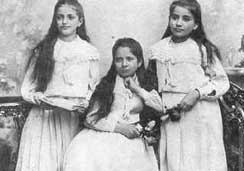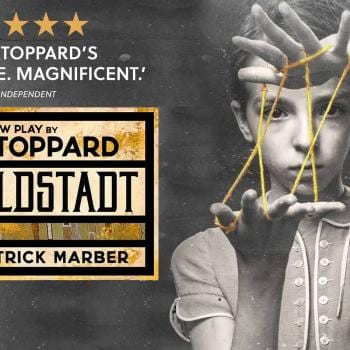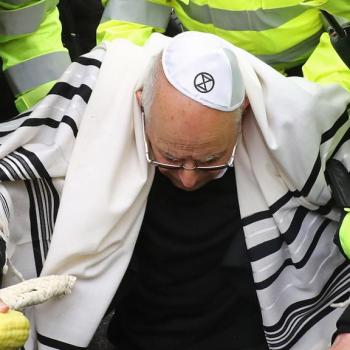Editors’ Note: This article is part of the Patheos Public Square on Moving Past Hatred. Read other perspectives here.
A contribution to the ‘Moving Past Hatred’ Patheos Public Square debate
When you start blogging about Israel/Palestine you can attract some quite unpleasant people.
Some turn out to be Jewish, some are Muslim, Christians are in the minority (I’m guessing the unpleasant ones are just busy elsewhere). Some will profess no faith at all.
From my own unscientific reckoning (based on emails, Facebook comments and Twitter interaction) I would say most of the ‘offenders’ are men. At the risk of being accused of sexism, I suspect my critical women readers prefer to pity my idiocy in silence or have better things to do than rant into the blogosphere.
My Jewish accusers usually stick to direct personal abuse describing me as “shameful”, “Marxist”, “narcissistic”, or a “traitor”. Occasionally, it gets a little stronger.
I was taken aback at first. Don’t they know what a nice, friendly, reasonable chap I am?
Well, obviously not. They’ve never met me and can only react to the words I’ve written which clearly provoke a very angry response. For the record, I also have Jewish (male) critics happy to engage with respect and politeness, which I hope I return in kind.
The good news I’ve taken from this is that I’m not just preaching to the Pro-Palestinian choir stalls.
I’m very aware that blogging can be the ultimate exercise in ‘narrowcasting’ and I certainly don’t want all my readers to think every word I write is marvelous. A few are those would be nice though!
I’ve toughened up since my early blogging days and now understand the online neighbourhood in which I’ve chosen to take up residence.
If you talk about Israel/Palestine, you soon discover there are very few people engaged in the subject who are politically nuanced or emotionally detached. The issue does not attract neutral observers. Get into this game kiddo, and you need a firm opinion pretty quick. Ambivalence and uncertainty are unwelcome guests in the Holy Land.
For those of you that haven’t lapped up every word I’ve written on the subject, you’re forgiven. For the benefit of new starters let me attempt a summary before I share some rather more extreme online reactions.
I’m a Jewish, religiously liberal, politically dissident (on Israel at any rate) supporter of Palestinian rights. I come at the issue from a Jewish diaspora perspective that sees not only an on-going physical and political threat to the Palestinians but a spiritual and cultural threat to Judaism and the Jewish people both today and into the future. I’ve now saved you a few hours of catch-up reading.
Even with a passing awareness of the situation, you will recognise that my position is a minority one within most Jewish communities. Jewish dissidence is growing but it’s still marginal and marginalised. So the Jewish vitriol that comes my way should not be entirely unexpected. I’m questioning the foundations of an Israel-centred modern Jewish identity. I’m rocking the family boat. I should expect a bit of flak.
Hatred in the ether
But soon after I started writing something else began to happen that I’ve found far more difficult to tolerate. I’ve found myself attracting a different form of commentary on my writing, one that uses my words as the jumping off point for incitement to genocide and, of late, Holocaust denial.
For some people, only spilling Jewish blood is the answer. For some people, only dead Arabs are acceptable.
It turns out that there is no shortage of hatred in the world and a considerable number of people who are firmly of the opinion there is little that can’t be solved (certainly in the Middle East) through a timely massacre of ‘the guilty’.
It was scary when I first read these opinions on Facebook or Twitter or blog pages that linked back to my writing. Often I’m pretty sure the people who say these things have not actually read a word I’ve written, or perhaps didn’t get past my deliberately provocative headline. Either way, it shakes your view of humanity. You have to hold on tight to the belief that however much hatred and intolerance there is in the world there is also a reservoir of love and kindness to be tapped into…somewhere.
The readers I could do without
My last blog post on Patheos, an interview with the Israeli peace activist Jeff Halper, has been an ugly case in point.
The piece took off very quickly, generating far more social media ‘shares’ than I’d expected. I put that down to Halper’s challenging and radical views on the role the global arms industry plays in suppressing criticism of Israel’s behaviour. Halper clearly has a following out there and people care about the issues.
But Halper’s rational and well-researched criticism of Israel began to attract an irrational and totally unacceptable response.
The only way to connect my interview with Halper to the subject matter of the comments coming through was: Anti-Semitism. Israel’s behaviour in the world arms market is, apparently, just the latest example of the moral disease and political deceit embodied by all Jews.
There was then a very short hop, skip and jump to assert that this habitual Jewish deceit also explains why the murder of six million Jews is a totally fabricated story perpetuated through an international Jewish conspiracy for the advancement of the Jewish people worldwide.
“…the so-called Holocaust is a contrived myth that never happened for many reasons. Let me list some of them.”
And then he did.
Here’s another example of counter-factual clap-trap that was coming through.
“There were NO homicidal gas chambers in Germany or in territory controlled by Germany. Not one! That is now officially admitted, though kept quiet, of course.”
I felt the need to immediately post my own comment to put on record that the distance between my views and theirs was several million miles.
Meanwhile, Halper’s use of the literary term ‘Kafkaesque‘ to describe the bureaucratic controls imposed by the Israelis on the West Bank was also picked up as another example of the innately twisted Jewish imagination.
“The “holocaust” came out of the Jewish mind! It was their imagination which created the Holocaust! (Read Kafka!)”
But I have read Kafka, who, by the way, died of tuberculosis in 1924.

Kafka certainly wrestled with his Jewish, German speaking, Czech identity but recruiting him as a self-hating Jew who in death can be used to promote Holocaust denial is well wide of the mark. Twisted in fact.
In my response to the Kafka comment I pointed out what had become of Kafka’s three sisters.
Like many other Jews from Prague, the sisters were deported during the war by the Nazis. Elli and Valli were sent with their families to the Lodz Ghetto, where they died soon after. Ottla, the sister Franz was most close to, was sent to the concentration camp at Theresienstadt. In October 1943, Ottla accompanied a group of children as a voluntary assistant to Auschwitz, where she was murdered.

I was grateful to those readers who waded in after me to condemn the Holocaust deniers. In particular the person who wrote that her father had been among the troops that liberated some of the concentration camps. “Was he lying?”, she asked.
How online anti-Semitism undermines Palestinian support
There are serious consequences when anti-Semitism can be seen to occupy space in the Israel/Palestine debate. For a start it causes enormous pain and offence for Jewish people, particularly those who lost relatives and those whose lives were damaged for ever.
But it also muddies the political waters considerably and gives Jews with concerns over Israel’s actions good reason to stay well away from anything approaching Palestinian solidarity.
I don’t believe it is anti-Semitic to criticise the Israeli government or to support boycotts, divestments or sanctions against the State of Israel or those who receive the state’s funding. You can read my letter to the Board of Deputies of British Jews if you want my reasons for thinking BDS is a legitimate tactic of solidarity with Palestinians and indeed solidarity with Jewish ethics.
But I’m in no doubt that there are critics of Israel and supporters of BDS who are in that space because it allows them to vent their extreme hostility towards Jews.
The anti-Jewish racism that this brings into an already complicated picture is, to put it mildly, massively unhelpful.
It allows Israel’s most robust supporters to make accusations of anti-Semitism against anyone and everyone who criticises Israel. The proximity of anti-Semitism to the cause of the Palestinians allows the entire movement to be vilified and dismissed, particularly in North America, Western Europe and Australia. Pro-Palestinian support gets cast as anti-Semitism’s latest incarnation. This clearly suits those looking to close down criticism of Israel without having to engage in a debate about national and civil rights, territorial occupation and settlements, international law, etc. Much easier to insist:they all hate us because we are Jews!
For the Palestinians, the existence, especially online, of anti-Semitism immediately shifts the whole debate from their plight to a discussion about current and historic Jewish suffering.
But there are also less extreme, fuzzier forms of hatred than Holocaust denial that can easily seep into Pro-Palestinian campaigning.
To put the most generous interpretation on it, I would say it is caused by a passion for Palestinian rights and a justified anger towards all those who allow, or just stand by, while those rights are trampled on. Combine that with the Jewish establishment’s refusal to allow a scintilla of Israeli criticism to pass its lips and then mix it with communal encouragement to defend Israel right or wrong, and it doesn’t take long for political discourse, online and on the street, to degenerate into tribal confrontations.
It’s not easy to see how to break out of this dead-end dynamic.
From my Jewish perspective I can see how anti-Semitism, from the hard core variety of Holocaust denial, through to the ignorant and politically clumsy approach of some direct actions by BDS supporters, turns off many Jews from speaking out on a subject that deeply troubles them.
A recent investigation ‘What’s Changed About Being Jewish in Scotland’ reported growing anxiety, feelings of physical threat and even deliberate concealing of religious identity by members of the country’s small Jewish community as a result of vociferous and confrontational Pro-Palestinian campaigning and reaction in Scotland to the 2014 Gaza War. While the discomfort of diaspora Jews hardly compares with the threats and living conditions faced daily by Palestinians on the West Bank and Gaza, I can understand that there’s something here that needs looking at.
I have two requests to make in an attempt to address this.
To concerned Jews I would say: don’t let the presence of anti-Semitism (in its major or minor varieties) blind you from seeing the big picture of Palestinian rights which should be addressed as a totally separate issue. Challenge the racism when you see it but recognise there is an urgent and legitimate debate about Israel that should not be stifled by our ‘official leaders’ or by attempts to reduce it to a new strain of anti-Semitism. And, how ever uncomfortable it may feel to you, recognise that Zionism, perhaps noble in its original intentions, has in practice played out in racist ways. So the boot is not always on someone else’s foot.
To the Pro-Palestinian movement, I would say this: the presence, or even perception, of anti-Semitism is one of the biggest threats to building a global movement of Palestinian solidarity. A very vocal and visible zero tolerance is essential. That means better guidance from organisers on how to demonstrate on the street and a sensitivity to language in every context, especially online. Also, be careful about the company you keep.
Returning to my own online existence, I’m a supporter of free speech, but not when in becomes incitement to hatred and violence or perpetuates racism of any kind.
So from now on I will be banning all Arab haters, islamophobes, genocide mongers, Holocaust deniers, as well as besmirchers of Kafka’s literary reputation, from my Patheos pages. I’ve had enough of the racist cuckoos attempting to lay their eggs in my online nest.
Let them start their own blogs (although I’d prefer them to just go away).
















